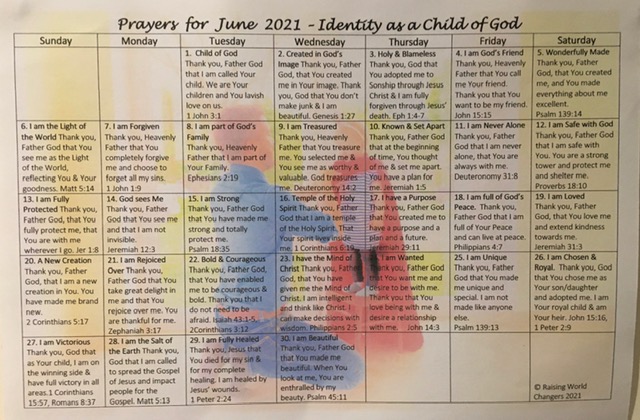This morning while watering the vegetable garden, I asked God many questions. Questions like “How do you want me to pray for my kids at the moment?”, “What should my involvement in Healing Rooms look like in 2023?”, “What about church?” etc. All big and important questions. I was expectant. Expecting God to download the answer to me immediately.
Simple.
Except I was not getting any answers. I change my question when I don’t get an answer or find it hard to hear God.
I changed my questions as I simultaneously placed the hose nozzle in the watering can on full bore. Loud noise filled the air. I said aloud, “I can’t hear God clearly in this din.”
Since I wanted to finish watering my plants and needed to fill the watering can for the final stretch, I kept the hose inside it, the din continuing. Meanwhile, another thought filled my mind. When I have junk in my life or stuff that’s not yet healed, I see and hear God through the lens of that unhealed ‘junk’. I took a few moments to ask God what lens or junk I was looking through at Him and trying to hear Him.
Sometimes we have placed walls up, walls of protection.
Other times, we may have withdrawn.
We may have had disappointments. Disappointment in God. In others. In ourselves.
Sometimes we still need a revelation of God’s love in a particular area of our life.
Sometimes we may be holding on to something tightly and not ready to surrender that to God fully.
An hour later, I was at a Doctor’s appointment. The Doctor shared with me how he and his wife wanted to do medical mission work overseas but didn’t want to go until their children were adults. They didn’t want their children to be laden with any serious medical issues from the parasites of third-world countries. I challenged him. “Did he have the faith to trust God to care for his children?”.
Today my friends, you have an opportunity to examine if you are perhaps looking at God through a particular lens.
The lens may be clear, cloudy, scratched, or coloured.
Usually, our lens being cloudy, scratched, or coloured means we have incorporated a faulty belief into our thinking.
Below are some prompts to ask God to hear His perspective on your current lens.
- “Father God, is there an area I still need to surrender to you?”
- “God, what do you say about …..?”
- “Lord, can you please show me any areas in my life or thoughts that are not in agreement with you, Lord?”
- “God, is there a lie I am believing about you?” If you hear, sense, or think of anything here, then deal with it with God. Repent. Then ask God, “what is the truth you want me to know?”
- “Holy Spirit, is there anyone I still need to forgive?” (If a person immediately comes to mind, please take that as a sign that forgiveness is still required).
- “Father God, is there a bitter root I’ve allowed to develop in my life from past hurts?”
- “Father God, what walls of protection have I built in my life?”
To help you unpack this further, take a few moments to spend time with God and ask:
- Father God, is there any lie or faulty belief I am believing?
- Grab the first thought through your head and explore that.
- Ask God to show or tell you why you believe that.
- Ask God if there is anyone you need to forgive. If anyone comes to mind, forgive that person. Bless them. Do you need to forgive yourself?
- Ask Father God to show, tell, or give you the truth.
God loves questions. Feel free to explore any of the above questions with Him.
God is also in the business of miracles, as nothing is too hard for Him. Ephesians 3:20 “Now to Him who is able to do immeasurably more than all we ask or imagine, according to His power that is at work within us.”
You may even appreciate and benefit from having some prayer ministry by a trusted, experienced person. Reach out to someone for help if you need to. Intimacy with Father God, Holy Spirit, and Jesus is so important, and often, we may not realize that past hurts are clouding our relationship.
Prophetic Activations / Exercises to incorporate into your week:
Every blog post I list 5 prophetic activations/exercises under children/family, group, beginner, intermediate and advanced. The purpose of these exercises is to practice to help us hear God’s voice in a clearer manner. They sharpen our senses to hear and see and sense God and His way of communicating with us. This enables us to grow in our relationship with God and also to impart to others what God tells us for them. Feel free to use as many of these activations each week as you can. The more you practice, the sharper you become at hearing God’s voice. Enjoy! Remember that whenever you give another person a prophetic word or picture etc, please make sure that it is encouraging, edifying (strengthening) and comforting (1 Corinthians 14:3) and that it comes from a place of love.
1. Children / Families Activation: Gather pencils, crayons and paper. Ask everyone to draw what God would love their teacher to know at the moment. Pass the papers on to the appropriate teacher.
2. Group Activation: Buy coloured jellybeans or smarties and place in a bowl. Get into small groups of 5-6 people with a bowl of jellybeans/smarties in each group. Ask everyone to take one and to take note of the colour they selected. If their lolly was yellow/orange – give a prophetic word to the person on their left. Red/pink – to the person opposite them. Blue/white – a person who serves well. Green – the quietest person in the group. Black/purple/brown – to the person they know the least.
3. Beginner Activation: Spend time focusing on God. Ask Him to show you what type of light you are and why.
4. Intermediate Activation: Spend time with God asking Him for a prophetic word for your member of Parliament. Ask God if you are to share it with them and how, or if it is for you to pray.
5. Advanced Activation: Spend time with God asking Him to show you His heart for the people in Turkey/Syria with the earthquake devastation. Ask God what He would like your response to be. Craft a prophetic word for you to declare about the outcome for these countries.










